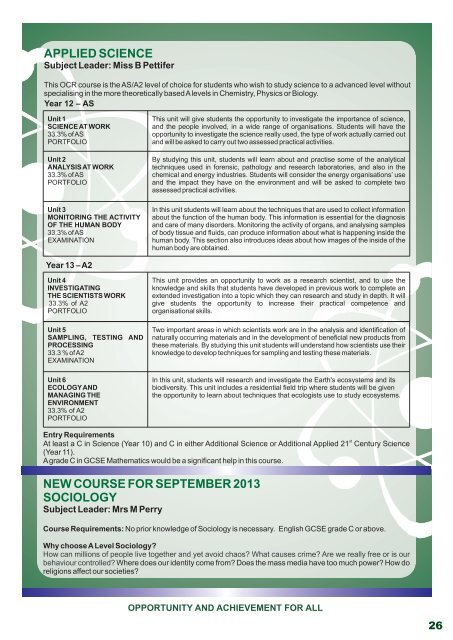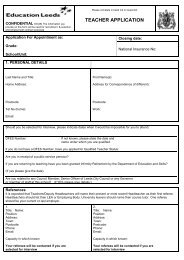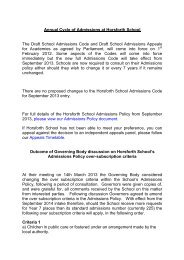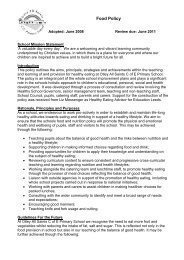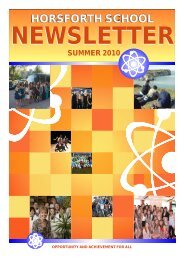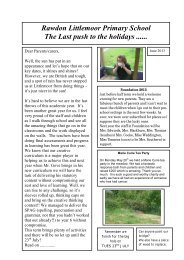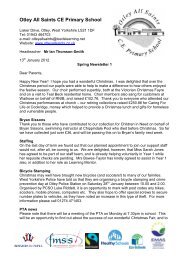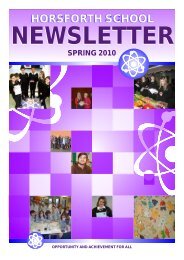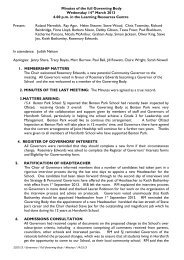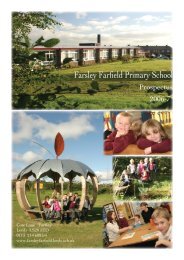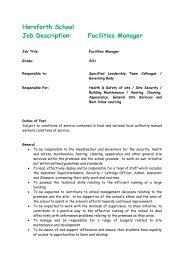POST-16 PROSPECTUS UPDATE SEP 11.cdr
POST-16 PROSPECTUS UPDATE SEP 11.cdr
POST-16 PROSPECTUS UPDATE SEP 11.cdr
Create successful ePaper yourself
Turn your PDF publications into a flip-book with our unique Google optimized e-Paper software.
APPLIED SCIENCE<br />
Subject Leader: Miss B Pettifer<br />
This OCR course is the AS/A2 level of choice for students who wish to study science to a advanced level without<br />
specialising in the more theoretically based A levels in Chemistry, Physics or Biology.<br />
Year 12 – AS<br />
Unit 1<br />
SCIENCE AT WORK<br />
33.3% of AS<br />
PORTFOLIO<br />
Unit 2<br />
ANALYSIS AT WORK<br />
33.3% of AS<br />
PORTFOLIO<br />
Unit 3<br />
MONITORING THE ACTIVITY<br />
OF THE HUMAN BODY<br />
33.3% of AS<br />
EXAMINATION<br />
This unit will give students the opportunity to investigate the importance of science,<br />
and the people involved, in a wide range of organisations. Students will have the<br />
opportunity to investigate the science really used, the type of work actually carried out<br />
and will be asked to carry out two assessed practical activities.<br />
By studying this unit, students will learn about and practise some of the analytical<br />
techniques used in forensic, pathology and research laboratories, and also in the<br />
chemical and energy industries. Students will consider the energy organisations’ use<br />
and the impact they have on the environment and will be asked to complete two<br />
assessed practical activities.<br />
In this unit students will learn about the techniques that are used to collect information<br />
about the function of the human body. This information is essential for the diagnosis<br />
and care of many disorders. Monitoring the activity of organs, and analysing samples<br />
of body tissue and fluids, can produce information about what is happening inside the<br />
human body. This section also introduces ideas about how images of the inside of the<br />
human body are obtained.<br />
Year 13 – A2<br />
Unit 4<br />
INVESTIGATING<br />
THE SCIENTISTS WORK<br />
33.3% of A2<br />
PORTFOLIO<br />
Unit 5<br />
SAMPLING, TESTING AND<br />
PROCESSING<br />
33.3 % of A2<br />
EXAMINATION<br />
This unit provides an opportunity to work as a research scientist, and to use the<br />
knowledge and skills that students have developed in previous work to complete an<br />
extended investigation into a topic which they can research and study in depth. It will<br />
give students the opportunity to increase their practical competence and<br />
organisational skills.<br />
Two important areas in which scientists work are in the analysis and identification of<br />
naturally occurring materials and in the development of beneficial new products from<br />
these materials. By studying this unit students will understand how scientists use their<br />
knowledge to develop techniques for sampling and testing these materials.<br />
Unit 6<br />
ECOLOGY AND<br />
MANAGING THE<br />
ENVIRONMENT<br />
33.3% of A2<br />
PORTFOLIO<br />
In this unit, students will research and investigate the Earth's ecosystems and its<br />
biodiversity. This unit includes a residential field trip where students will be given<br />
the opportunity to learn about techniques that ecologists use to study ecosystems.<br />
Entry Requirements<br />
st<br />
At least a C in Science (Year 10) and C in either Additional Science or Additional Applied 21 Century Science<br />
(Year 11).<br />
A grade C in GCSE Mathematics would be a significant help in this course.<br />
NEW COURSE FOR <strong>SEP</strong>TEMBER 2013<br />
SOCIOLOGY<br />
Subject Leader: Mrs M Perry<br />
Course Requirements: No prior knowledge of Sociology is necessary. English GCSE grade C or above.<br />
Why choose A Level Sociology?<br />
How can millions of people live together and yet avoid chaos? What causes crime? Are we really free or is our<br />
behaviour controlled? Where does our identity come from? Does the mass media have too much power? How do<br />
religions affect our societies?<br />
OPPORTUNITY AND ACHIEVEMENT FOR ALL<br />
26


